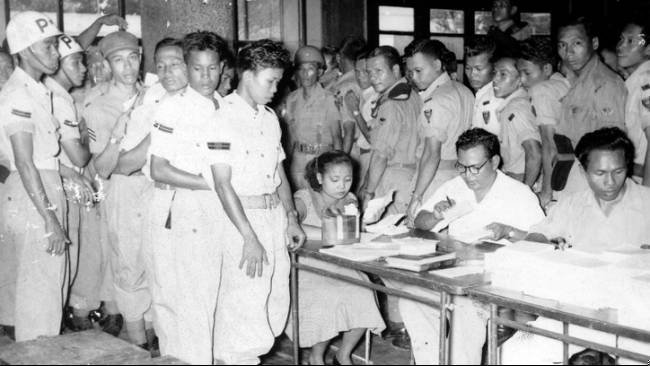The pemilihan umum tahun 1955 tahap pertama pada tanggal 29 September bertujuan untuk memilih representatives in Indonesia’s first democratic election. This pivotal event marked a turning point in the nation’s political landscape, allowing citizens to voice their choices openly.
As people headed to the polls, they embraced the opportunity to shape their future and lay the groundwork for a more democratic society. The atmosphere buzzed with excitement and anticipation, reflecting hopes for a new era in Indonesian governance.
“`html
pemilihan umum tahun 1955 tahap pertama pada tanggal 29 september bertujuan untuk memilih
The first stage of the 1955 general election in Indonesia, held on September 29, marked a significant moment in the country’s democratic journey. The main aim of this election was to select members of the People’s Consultative Assembly (Majelis Permusyawaratan Rakyat – MPR), which would play a crucial role in shaping the nation’s future. In this article, we will explore in detail the purpose, significance, and the broader context of the September 1955 elections, along with the political atmosphere at the time and the impact it made on Indonesian society.
Historical Context of the Election
To understand the 1955 elections, we first need to look back at Indonesia’s history. After declaring independence from Dutch colonial rule in 1945, Indonesia faced numerous challenges, including political instability, economic difficulties, and the need to unite a diverse population.
In 1949, Indonesia managed to gain international recognition of its sovereignty through the Round Table Conference. However, the country struggled to establish a stable government. The 1955 elections aimed to create a framework for a more democratic system.
The Significance of the 1955 Elections
The 1955 general elections held great significance for Indonesia for several reasons:
- Establishing Democratic Principles: This election marked the first free elections since independence, allowing citizens to express their political preferences.
- Representation: The election enabled various political parties to gain representation in government, reflecting the diverse interests of the people.
- Formation of a New Assembly: The People’s Consultative Assembly was tasked with drafting a new constitution, paving the way for future governance.
- Encouraging Political Participation: The elections encouraged citizens to engage in political processes, fostering a culture of civic involvement.
Political Parties Involved
Multiple political parties participated in the 1955 elections, each representing different ideologies and interests. Some of the most notable parties included:
- Partai Nasional Indonesia (PNI): The National Party was a nationalist party advocating for Indonesian unity and independence.
- Majelis Syuro Muslimin Indonesia (Masyumi): This Islamic party focused on promoting Islamic values in governance.
- Partai Komunis Indonesia (PKI): The Indonesian Communist Party sought to establish socialist policies and was influential among the working class.
- Socialist Party of Indonesia (PSI): This party aimed to promote social justice and was popular among urban intellectuals.
The Election Process
On September 29, 1955, Indonesian citizens went to the polls to cast their votes. The process was designed to be straightforward, allowing as many eligible voters as possible to participate.
Voting Eligibility
Any Indonesian citizen aged 17 and above was eligible to vote, a significant move towards inclusive democracy. This decision empowered millions of Indonesians to have a say in their governance.
Voting Procedure
The voting process included:
- Ballot Papers: Voters received ballot papers that listed various political parties.
- Privacy: Voting booths ensured privacy, making it possible for citizens to vote without coercion.
- Counting Votes: After the polls closed, votes were counted publicly, promoting transparency in the electoral process.
Voter Turnout and Public Sentiment
Public interest in the elections was remarkable. Citizens exhibited a strong desire to participate in shaping their government. Voter turnout was approximately 85%, which was exceptional for that time.
This high turnout indicated widespread enthusiasm and trust in the electoral process. Many citizens believed that these elections would be a turning point for Indonesia, leading to stability and development.
The Results of the Election
Once the votes were counted, the election results revealed a diverse political landscape:
- PNI emerged as the winner, securing the most seats in the assembly.
- Masyumi and PKI followed closely, reflecting the significant Islamic and communist influences in society.
- PSI gained a respectable number of seats, indicating a solid base of support among urban voters.
The Formation of the People’s Consultative Assembly
After the election, the newly elected members of the assembly met to discuss the future of Indonesia. Their primary task was to draft a new constitution that would outline the principles of governance.
Key Objectives of the Assembly
The assembly aimed to:
- Establish Democratic Governance: Set up a system that would ensure fair representation and accountability.
- Protect Minority Rights: Ensure that the voices of various ethnic and religious groups were heard.
- Promote Economic Development: Create policies that would foster economic growth and reduce poverty.
Challenges Faced by the Assembly
Despite the positive momentum, the assembly faced several challenges:
- Political Tensions: Conflicts among different political factions created a tense atmosphere.
- Regional Differences: Diverse interests from various islands and regions led to disagreements on policies.
- Economic Pressures: Indonesia was grappling with economic difficulties that complicated policy-making.
The Impact of the 1955 Elections
The results of the 1955 elections had both immediate and long-term impacts on Indonesia:
- Rise of Political Awareness: Citizens became more aware of their rights and the importance of their votes.
- Shaping Future Elections: The structure and outcomes set the stage for future electoral practices in Indonesia.
- Policy Development: Early policies drafted by the assembly aimed to respond to public needs, influencing future governance.
Legacy of the 1955 Elections
The legacy of the 1955 general elections continues to influence Indonesian politics today. It not only laid the groundwork for democratic processes in Indonesia but also highlighted the ongoing struggle to balance various interests within a diverse nation.
Reflecting on this election helps us understand how far Indonesia has come and the importance of continued civic engagement in sustaining democracy.
In conclusion, the first stage of the 1955 general election was a pivotal moment in Indonesia’s history. It empowered citizens, established a participatory political framework, and set the groundwork for a more democratic Indonesia. The election not only represented a turning point for the nation but also ignited a commitment to greater political involvement among its citizens, which remains crucial for the country’s future.
“`
Pemilihan Umum Pertama | Pemilu Tahun 1955
Frequently Asked Questions
What was the significance of the first stage of the 1955 general elections in Indonesia?
The first stage of the 1955 general elections in Indonesia held on September 29 aimed to foster democracy in the newly independent nation. It marked a crucial step in establishing a parliamentary system and allowed citizens to participate in the political process, ultimately paving the way for the formation of a representative government. This election also aimed to legitimize the political parties and establish a stable political environment in the country.
How did the results of the 1955 elections impact Indonesian politics?
The results of the 1955 elections had a profound impact on Indonesian politics by bringing various political parties into the spotlight. The election results revealed the public’s political preferences and highlighted the need for coalition-building among parties. This influenced the governance structure, as it necessitated cooperation and negotiation among different political factions, leading to the formation of a more inclusive government.
What were the main political parties involved in the 1955 elections?
Several key political parties participated in the 1955 elections, including the Indonesian National Party (PNI), the Masyumi Party, and the Nahdlatul Ulama (NU). These parties represented various ideological lines, such as nationalism, Islamic values, and social democracy, reflecting the diverse political landscape in Indonesia at the time. Their participation was essential for representing the interests of different segments of society.
What challenges did Indonesia face during the 1955 elections?
Indonesia faced numerous challenges during the 1955 elections, including logistical issues, security concerns, and political instability. The country had to overcome the aftermath of colonial rule and internal divisions among various ethnic and political groups. Additionally, effective voter education and ensuring fair access to the polls posed significant challenges, which the government had to address to facilitate smooth electoral proceedings.
How did the 1955 elections contribute to Indonesia’s democratic development?
The 1955 elections played a pivotal role in Indonesia’s democratic development by institutionalizing the electoral process and encouraging political participation among citizens. The elections served as a practical experience in democracy and highlighted the importance of civic engagement. They laid the groundwork for future elections and political reforms, ultimately contributing to the progression of democratic governance in Indonesia.
Final Thoughts
Pemilihan umum tahun 1955 tahap pertama pada tanggal 29 September bertujuan untuk memilih anggota Dewan Perwakilan Rakyat. Proses ini menandai langkah penting dalam sejarah politik Indonesia setelah merdeka. Melalui pemilihan ini, rakyat berpartisipasi secara aktif dalam menentukan wakil-wakil mereka. Hasil pemilihan menjadi landasan bagi pembentukan pemerintahan yang lebih demokratis dan representatif.






